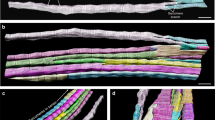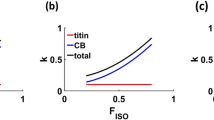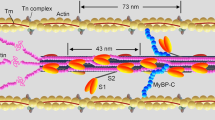Abstract
THE relationship between the velocity of shortening v and a constant load w on an excited striated muscle is given by Hill's equation:  where P is the isometric tension and a, b are constants. Hill1 first derived this relation experimentally. Later work2 has shown that this relation accurately describes the force–velocity relation for many kinds of muscle. One of the main criticisms of Hill's equation has been that it does not directly suggest any conceptual model of a physico-chemical system2,3.
where P is the isometric tension and a, b are constants. Hill1 first derived this relation experimentally. Later work2 has shown that this relation accurately describes the force–velocity relation for many kinds of muscle. One of the main criticisms of Hill's equation has been that it does not directly suggest any conceptual model of a physico-chemical system2,3.
This is a preview of subscription content, access via your institution
Access options
Subscribe to this journal
Receive 51 print issues and online access
$199.00 per year
only $3.90 per issue
Buy this article
- Purchase on Springer Link
- Instant access to full article PDF
Prices may be subject to local taxes which are calculated during checkout
Similar content being viewed by others
References
Hill, A. N., Proc. Roy. Soc., B, 126, 136 (1938).
Abbott, B. C., and Wilkie, D. R., J. Physiol., 120, 214 (1953).
Pringle, J. W. S., Symp. Soc. Exp. Biol., 14, 41 (1960).
Spencer, M., and Worthington, C. R., Nature, 187, 388 (1960).
Author information
Authors and Affiliations
Rights and permissions
About this article
Cite this article
WORTHINGTON, C. Conceptual Model for the Force–Velocity Relation of Muscle (Hill's Equation). Nature 193, 1283–1284 (1962). https://doi.org/10.1038/1931283a0
Issue Date:
DOI: https://doi.org/10.1038/1931283a0
Comments
By submitting a comment you agree to abide by our Terms and Community Guidelines. If you find something abusive or that does not comply with our terms or guidelines please flag it as inappropriate.



